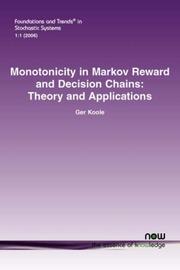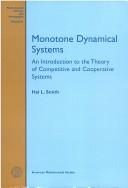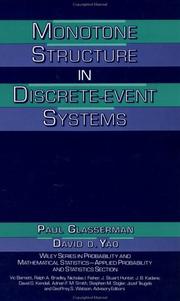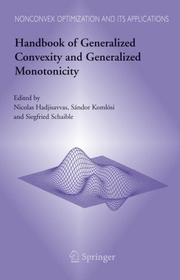| Listing 1 - 10 of 17 | << page >> |
Sort by
|
Book
ISBN: 9048166691 9789048166695 Year: 2010 Publisher: Dordrecht: Kluwer Academic Publishers,
Abstract | Keywords | Export | Availability | Bookmark
 Loading...
Loading...Choose an application
- Reference Manager
- EndNote
- RefWorks (Direct export to RefWorks)
In contrast to the prevailing tradition in epistemology, the focus in this book is on low-level inferences, i.e., those inferences that we are usually not consciously aware of and that we share with the cat nearby which infers that the bird which she sees picking grains from the dirt, is able to fly. Presumably, such inferences are not generated by explicit logical reasoning, but logical methods can be used to describe and analyze such inferences. Part 1 gives a purely system-theoretic explication of belief and inference. Part 2 adds a reliabilist theory of justification for inference, with a qualitative notion of reliability being employed. Part 3 recalls and extends various systems of deductive and nonmonotonic logic and thereby explains the semantics of absolute and high reliability. In Part 4 it is proven that qualitative neural networks are able to draw justified deductive and nonmonotonic inferences on the basis of distributed representations. This is derived from a soundness/completeness theorem with regard to cognitive semantics of nonmonotonic reasoning. The appendix extends the theory both logically and ontologically, and relates it to A. Goldman's reliability account of justified belief.

ISBN: 9781601980281 1601980280 Year: 2007 Publisher: Boston: Now,
Abstract | Keywords | Export | Availability | Bookmark
 Loading...
Loading...Choose an application
- Reference Manager
- EndNote
- RefWorks (Direct export to RefWorks)

ISBN: 082180393X 9780821803936 Year: 1995 Volume: 41 Publisher: Providence, R.I. : American Mathematical Society,
Abstract | Keywords | Export | Availability | Bookmark
 Loading...
Loading...Choose an application
- Reference Manager
- EndNote
- RefWorks (Direct export to RefWorks)

ISBN: 0471580414 Year: 1994 Publisher: New York (N.Y.) : Wiley,
Abstract | Keywords | Export | Availability | Bookmark
 Loading...
Loading...Choose an application
- Reference Manager
- EndNote
- RefWorks (Direct export to RefWorks)
Discrete-time systems. --- Monotonic functions. --- System analysis.

ISBN: 3540065431 0387065431 3642657575 3642657559 9783540065432 Year: 1974 Volume: 207 Publisher: Berlin Springer
Abstract | Keywords | Export | Availability | Bookmark
 Loading...
Loading...Choose an application
- Reference Manager
- EndNote
- RefWorks (Direct export to RefWorks)
Book
ISBN: 2870771819 9782870771815 Year: 1984 Volume: 1 Publisher: Louvain-la-Neuve : Cabay,
Abstract | Keywords | Export | Availability | Bookmark
 Loading...
Loading...Choose an application
- Reference Manager
- EndNote
- RefWorks (Direct export to RefWorks)
Analyse --- Differential calculus --- Calculus, Integral --- Analyse mathématique --- Mathematical analysis --- Series --- DIFFERENTIABILITY --- INTEGRALS --- INTEGRABILITY --- METRIC SPACE --- DIFFERENTIAL FORMS --- VARIATION METHOD --- CONTINUITY --- Continuous functions --- LIMITS --- Differential equations --- MONOTONIC FUNCTIONS --- Analyse mathématique.

ISBN: 1280459816 9786610459810 0387233938 0387232559 1489995021 9780387232553 9780387233932 Year: 2005 Volume: 76 Publisher: New York, NY Springer Science + Business Media, Inc.
Abstract | Keywords | Export | Availability | Bookmark
 Loading...
Loading...Choose an application
- Reference Manager
- EndNote
- RefWorks (Direct export to RefWorks)
Various generalizations of the classical concept of a convex function have been introduced, especially during the second half of the 20th century. Generalized convex functions are the many nonconvex functions which share at least one of the valuable properties of convex functions. Apart from their theoretical interest, they are often more suitable than convex functions to describe real-word problems in disciplines such as economics, engineering, management science, probability theory and in other applied sciences. More recently, generalized monotone maps which are closely related to generalized convex functions have also been studied extensively. While initial efforts to generalize convexity and monotonicity were limited to only a few research centers, today there are numerous researchers throughout the world and in various disciplines engaged in theoretical and applied studies of generalized convexity/monotonicity (see http://www.genconv.org). The Handbook offers a systematic and thorough exposition of the theory and applications of the various aspects of generalized convexity and generalized monotonicity. It is aimed at the non-expert, for whom it provides a detailed introduction, as well as at the expert who seeks to learn about the latest developments and references in his research area. Results in this fast growing field are contained in a large number of scientific papers which appeared in a variety of professional journals, partially due to the interdisciplinary nature of the subject matter. Each of its fourteen chapters is written by leading experts of the respective research area starting from the very basics and moving on to the state of the art of the subject. Each chapter is complemented by a comprehensive bibliography which will assist the non-expert and expert alike.
Convex functions. --- Monotonic functions. --- Functions, Monotonic --- Functions of real variables --- Functions, Convex --- Convex functions --- Monotonic functions --- Mathematics. --- Real Functions. --- Game Theory, Economics, Social and Behav. Sciences. --- Operations Research, Management Science. --- Math --- Science --- Functions of real variables. --- Game theory. --- Operations research. --- Management science. --- Games, Theory of --- Theory of games --- Mathematical models --- Mathematics --- Real variables --- Functions of complex variables --- Quantitative business analysis --- Management --- Problem solving --- Operations research --- Statistical decision --- Operational analysis --- Operational research --- Industrial engineering --- Management science --- Research --- System theory

ISBN: 128014839X 9780387236392 9786610148394 0387236392 0387236384 1441936475 9780387236391 9780387236384 Year: 2005 Volume: 77 Publisher: Boston, MA Springer Science + Business Media, Inc.
Abstract | Keywords | Export | Availability | Bookmark
 Loading...
Loading...Choose an application
- Reference Manager
- EndNote
- RefWorks (Direct export to RefWorks)
This volume contains a collection of refereed articles on generalized convexity and generalized monotonicity. The first part of the book contains invited papers by leading experts (J.M. Borwein, R.E. Burkard, B.S. Mordukhovich and H. Tuy) with applications of (generalized) convexity to such diverse fields as algebraic dynamics of the Gamma function values, discrete optimization, Lipschitzian stability of parametric constraint systems, and monotonicity of functions. The second part contains contributions presenting the latest developments in generalized convexity and generalized monotonicity: its connections with discrete and with continuous optimization, multiobjective optimization, fractional programming, nonsmooth Aanalysis, variational inequalities, and its applications to concrete problems such as finding equilibrium prices in mathematical economics, or hydrothermal scheduling. Audience This volume is suitable for faculty, graduate students, and researchers in mathematical programming, operations research, convex analysis, nonsmooth analysis, game theory and mathematical economics.
Convex functions --- Monotonic functions --- Functions, Monotonic --- Functions of real variables --- Functions, Convex --- Mathematical optimization. --- Mathematics. --- Operations Research, Management Science. --- Optimization. --- Calculus of Variations and Optimal Control; Optimization. --- Game Theory, Economics, Social and Behav. Sciences. --- Math --- Science --- Optimization (Mathematics) --- Optimization techniques --- Optimization theory --- Systems optimization --- Mathematical analysis --- Maxima and minima --- Operations research --- Simulation methods --- System analysis --- Operations research. --- Management science. --- Calculus of variations. --- Game theory. --- Operational analysis --- Operational research --- Industrial engineering --- Management science --- Research --- System theory --- Games, Theory of --- Theory of games --- Mathematical models --- Mathematics --- Isoperimetrical problems --- Variations, Calculus of --- Quantitative business analysis --- Management --- Problem solving --- Statistical decision --- Convex functions - Congresses --- Monotonic functions - Congresses
Book
ISBN: 9781402069185 1402069189 1402069197 Year: 2008 Volume: 1693 Publisher: Dordrecht : Springer Netherlands : Imprint: Springer,
Abstract | Keywords | Export | Availability | Bookmark
 Loading...
Loading...Choose an application
- Reference Manager
- EndNote
- RefWorks (Direct export to RefWorks)
In this new edition of LNM 1693 the essential idea is to reduce questions on monotone multifunctions to questions on convex functions. However, rather than using a “big convexification” of the graph of the multifunction and the “minimax technique”for proving the existence of linear functionals satisfying certain conditions, the Fitzpatrick function is used. The journey begins with a generalization of the Hahn-Banach theorem uniting classical functional analysis, minimax theory, Lagrange multiplier theory and convex analysis and culminates in a survey of current results on monotone multifunctions on a Banach space. The first two chapters are aimed at students interested in the development of the basic theorems of functional analysis, which leads painlessly to the theory of minimax theorems, convex Lagrange multiplier theory and convex analysis. The remaining five chapters are useful for those who wish to learn about the current research on monotone multifunctions on (possibly non reflexive) Banach space.
Monotone operators. --- Monotonic functions. --- Banach spaces. --- Opérateurs monotones --- Fonctions monotones --- Banach, Espaces de --- Monotone operators --- Monotonic functions --- Banach spaces --- Duality theory (Mathematics) --- Calculus --- Mathematics --- Physical Sciences & Mathematics --- Maxima and minima. --- Opérateurs monotones --- EPUB-LIV-FT SPRINGER-B --- Functions, Monotonic --- Minima --- Mathematics. --- Functional analysis. --- Operator theory. --- Calculus of variations. --- Functional Analysis. --- Calculus of Variations and Optimal Control; Optimization. --- Operator Theory. --- Isoperimetrical problems --- Variations, Calculus of --- Maxima and minima --- Functional analysis --- Functional calculus --- Calculus of variations --- Functional equations --- Integral equations --- Math --- Science --- Functions of real variables --- Operator theory --- Algebra --- Mathematical analysis --- Topology --- Functions of complex variables --- Generalized spaces --- Mathematical optimization. --- Optimization (Mathematics) --- Optimization techniques --- Optimization theory --- Systems optimization --- Operations research --- Simulation methods --- System analysis
Book
ISBN: 3319510614 3319510606 Year: 2017 Publisher: Cham : Springer International Publishing : Imprint: Springer,
Abstract | Keywords | Export | Availability | Bookmark
 Loading...
Loading...Choose an application
- Reference Manager
- EndNote
- RefWorks (Direct export to RefWorks)
This book provides an evaluation of 18 voting procedures in terms of the most important monotonicity-related criteria in fixed and variable electorates. All voting procedures studied aim at electing one out of several candidates given the voters' preferences over the candidates. In addition to (strict) monotonicity failures, the vulnerability of the procedures to variation of the no-show paradoxes is discussed. All vulnerabilities are exemplified and explained. The occurrence of the no-show paradoxes is related to the presence or absence of a Condorcet winner. The primary readership of this book are scholars and students in the area of social choice.
Monotonic functions. --- Functions, Monotonic --- Functions of real variables --- Political economy. --- Welfare economics. --- Economic theory. --- Political science --- International Political Economy. --- Social Choice/Welfare Economics/Public Choice/Political Economy. --- Economic Theory/Quantitative Economics/Mathematical Methods. --- Political Philosophy. --- Political philosophy --- Economic theory --- Political economy --- Social sciences --- Economic man --- Economic policy --- Economics --- Social policy --- Philosophy. --- Political philosophy.
| Listing 1 - 10 of 17 | << page >> |
Sort by
|

 Search
Search Feedback
Feedback About UniCat
About UniCat  Help
Help News
News